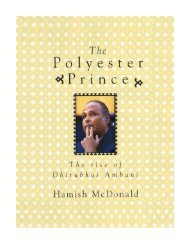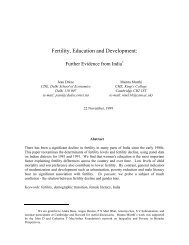Create successful ePaper yourself
Turn your PDF publications into a flip-book with our unique Google optimized e-Paper software.
Jayan Shah remembers Dhirubhai, who was about seven years younger than him,<br />
coming to Anand Bhavan. Jayan Shah’s father took an interest in other people<br />
children, lending them books to read and asking them to do odd jobs around the<br />
house. Dhirubhai was welcomed with great affection, and returned it with respect.<br />
Later, when he had gone away to work overseas, Shah remembers him dropping by<br />
to pay his respects during a vacation back in Chorwad, arriving with great gusto and<br />
a feeling of an old relationship.<br />
<strong>The</strong> guild-like support of his merchant caste helped Dhirubhai continue his education<br />
after finishing at his father’s old primary school. In 1945, he moved up to Junagadh<br />
and enrolled at the Bahadur Kanji High School. This shared with a university college<br />
a large yellow stucco edifice on the outskirts of the city that had been built in 1902<br />
by the nawab of the time and named after him. Because of his family’s poverty,<br />
Dhirubhai was admitted as a free student. He found accommodation in a boarding<br />
house funded by the Modh Bania for children of their caste.<br />
<strong>The</strong> Second World War had largely passed by Kathiawar, save for overfights by<br />
military transports and the occasional visit of the new army jeeps. <strong>The</strong> movement for<br />
Indian independence had not. On returning from South Africa, Gandhi had<br />
established his ashram in Ahmedabad, the main city of Gujarat, and carried out<br />
many of his agitations against British rule in the same region, including the famous<br />
‘Salt March’s to the sea to protest against the government monopoly of salt in 1930.<br />
His activities were financed by Indian industrialists from the Hindu trading castes,<br />
fore-most among them the Calcutta-based Marwari jute-miller G. D. Birla. His<br />
abstemious lifestyle was an extension of their own ideals, more familiar to them than<br />
the Anglicized manners of the Nehru family. But a real self-interest was also<br />
involved. <strong>The</strong> industrialists also saw in the Bania-born Gandhi a counterforce within<br />
the Indian National Congress-the main secular vehicle of the independence<br />
movement-to the socialist and communist ideas that had taken a strong grip on the<br />
thinking of educated Indians. Gandhi’s ideas of industrial devolution to the villages<br />
were intrinsically opposed to the proposals for state capitalism and central planning<br />
of investment then being promoted by the Left in India as elsewhere in the world.<br />
In Junagadh, the ideas of Gandhi and Sardar Patel, the Hindu nationalist lieutenant<br />
of Nehru who was also a Gujarati, cast a strong influence. <strong>The</strong> Nawab, with his<br />
Indian Political Service Resident Mr. Monteith at his side, was automatically put in<br />
defence of the status quo. His police force and its detective branch kept a close<br />
watch on the independence movement, and carried out many arrests of agitators<br />
throughout the 1940s.<br />
At the Bahadur Kanji School, Dhirubhai was quickly infected by the independence<br />
mood. Krishnakant Vakharia, later a leading lawyer in Ahmedabad, was two years<br />
ahead of Dhirubhai at the school and met him soon after his arrival in Junagadh. <strong>The</strong><br />
two took part in a gathering of students to discuss the freedom movement. Vakharia<br />
recalls that all were inspired by the nationalist ideals of Gandhi, Nehru, Patel and<br />
most of all the socialist Jayaprakash Narayan, then still in the Congress Party.<br />
<strong>The</strong> Modh boarding house where Dhirubhai was staying became the headquarters of<br />
a new group to push these ideals, which they called the Junagadh Vidyarti Sangh<br />
(Junagadh Students’ League). <strong>The</strong> objective was to take part in the national<br />
independence movement and Gandhi’s swadeshi (self-reliant) economic programme,




